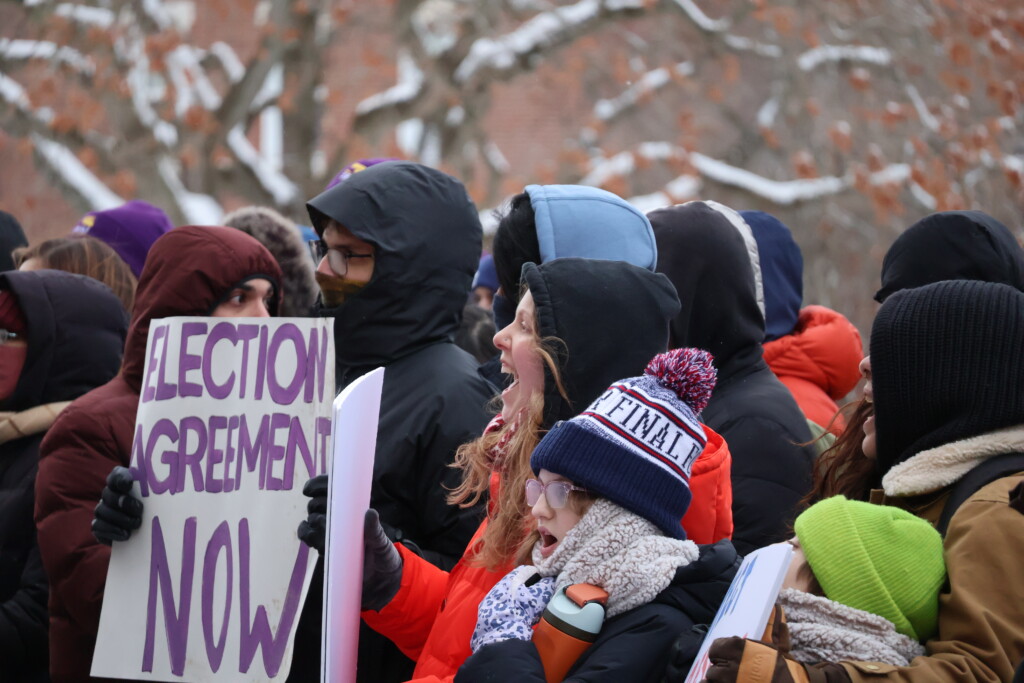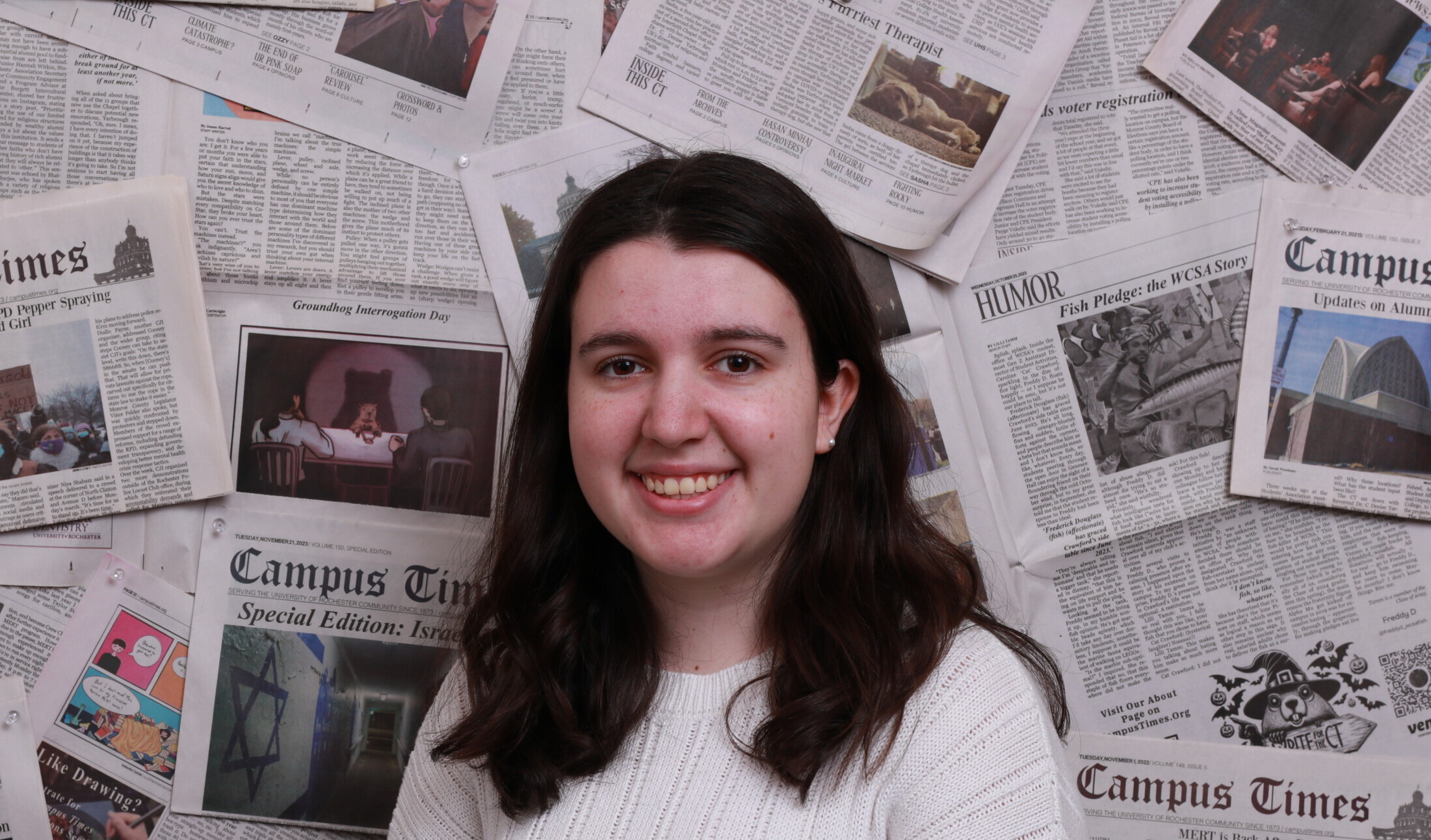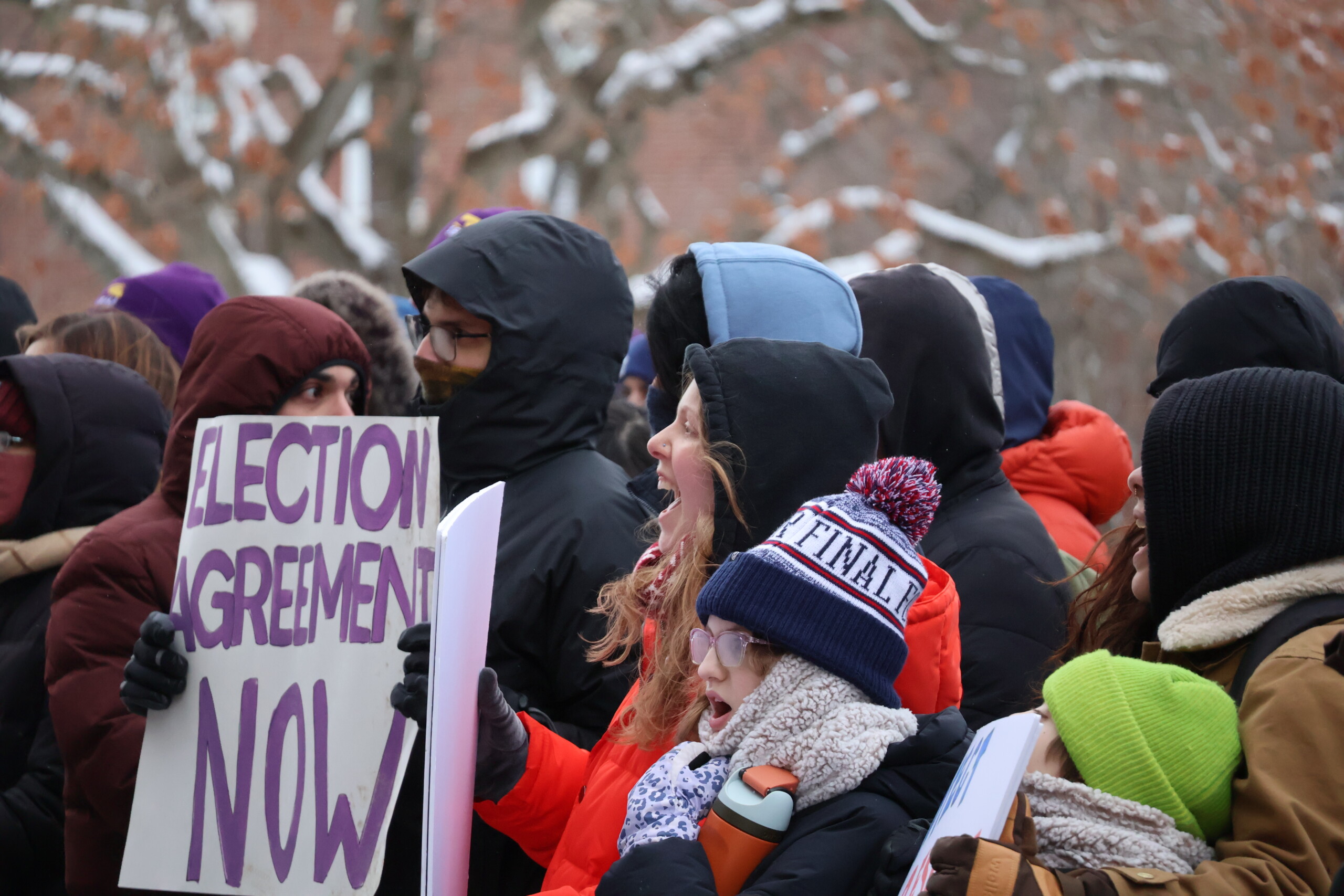University of Rochester community members gathered in Wilson Quad Feb. 18 to listen as speakers laid out their reasons for graduate student unionization.
This protest came in the wake of a rally held Jan. 30, in which participants demanded that University President Sarah Mangelsdorf sign an election agreement that would allow grad students to vote to form a union. As of the time of writing, no agreement has been signed.
For graduate students, this protest is the last resort before they begin seriously considering striking.
“This is very important to us. We deserve better treatment, and, you know, we’ve told them over and over again, we’re not afraid to escalate, we’re not backing down,” said organizer George Elkind. “And this is us following through with that.”

The Campus Times estimates that around 150 people attended the protest. Attendees include graduate students, undergraduates, faculty, community members, and family members of supporters. Prompted by the speakers, the crowd shouted several chants throughout the protest.
The rally lasted about an hour and featured a series of speakers who shared their personal experiences to illustrate their support for a union.
Emefa Amoah, a fifth-year Ph.D. student, spoke about struggling with the University’s actions regarding her academic status after her mother passed away in 2021.
“Within 72 hours of her death, I had to make a choice,” she said. “I had to either take a bereavement leave and lose my income, my health insurance, one year of funding — on top of restarting my student loan payments — or shut down my grief and return to work because I was too poor to afford the time to mourn.”

Emefa Amoah, pictured, is a graduate student studying Social-Personality Psychology through the Department of Psychology. As well as giving a speech, she also emceed the event.
Amoah described how she wished someone else would have stood up for her. “A union would never have let this happen,” she said. “A union would have protected the dignity and respect that this university took from me.”
Amoah explained the strike pledge was a “commitment to stand together” and for the administration to “learn just how far we are willing to go” rather than an official start to a strike.
“Today’s strike pledge is just the first step. We will not move forward without everyone’s support because a union is a democracy that must reflect the will of the people,” she said. “That said, I’d like to be blunt: If we want a union but choose inaction, we’re not just avoiding discomfort, we’re handing our power to the University.”
In addition to graduate students, undergraduates and faculty members attended the protest in support.
Take Five student Jacob Edwards spoke as a representative of the undergraduate Student Association (SA) acknowledging graduate students’ contributions to the undergraduate experience.
“Part of their mission is caring about our education, and I hope it is clear to all of the undergraduate students who are not here today — as I know it matters to those who are — how much poorer an experience we would have if not for their hard work and their care for us,” he said. “So that’s why I’m here supporting our grad students today, and why I’m confident if the time comes for our grads to strike, the undergraduate students are prepared to stand alongside them.”
Tacarah Reyes, a River Campus dining services worker, pointed to her team’s successful unionization efforts last year and said that she wants the same for graduate students.
“What we want to change is for grad workers to organize and to fight,” she said. “Exercise your rights, your voice.”
Afterward, New York State Assemblywoman Sarah Clark took the microphone to express support for the students.
“We, from the bottom of our hearts as a state delegation, are behind you all the way. We believe that it’s time to get this agreement signed,” she said.

Throughout the event, volunteers passed around clipboards for attendees to sign in and grab an “I stand with graduate workers!” sticker. They also encouraged graduate students to sign strike pledges, which are meant to prove a commitment to union support to University administration.
The University’s delay in signing the agreement comes after a recent court case involving Vanderbilt University’s graduate student unionization efforts. The courts decided that the university did not have to give student information to a potential union.
“The University now needs some additional time to review and consider the ramifications of the proposed agreement in light of a court decision in the Vanderbilt University v. National Labor Relations Board case, which was decided in December,” University Spokesperson Sarah Miller said in email correspondence with the CT.
Still, the University plans to continue discussions about the Election Agreement.

“Oh my goodness, it’s really cold,” said Assemblywoman Sarah Clark in her speech. “But I just desperately wanted to make sure you knew that we all have your back.”
“The University supports the right of our Ph.D. students to decide whether union representation is right for them. We take this process very seriously and plan to follow-up as quickly as possible with the union about the impact of these recent changes in the legal environment,” Miller said.
Graduate student organizers are ready to do “whatever it takes” to form a union.
“We feel like there’s an extreme need here to get it done as quickly as possible,” said organizer Katie Gregory, a Ph.D. candidate in the Department of Earth and Environmental Sciences. “Up to and including a strike, everything’s on the table.”



